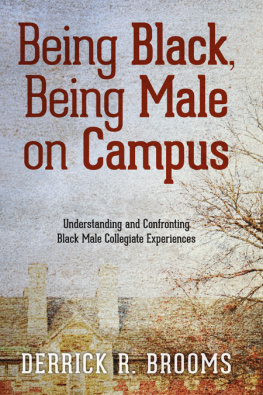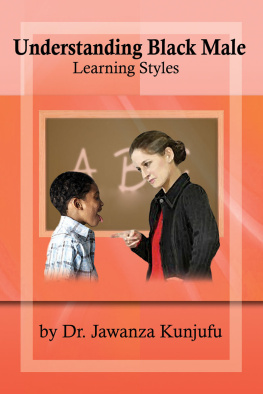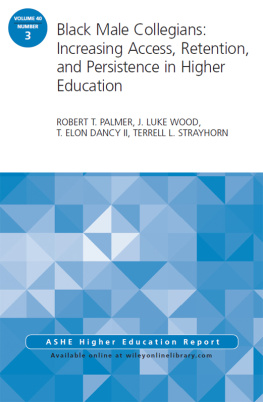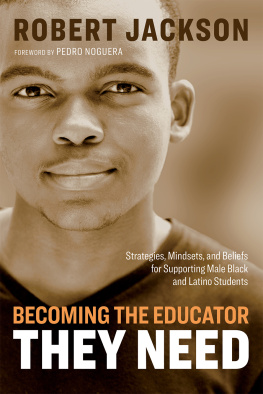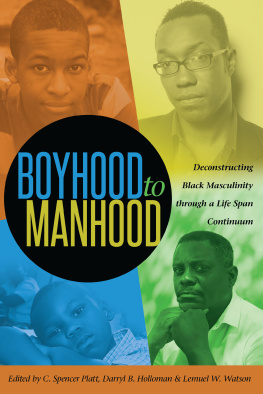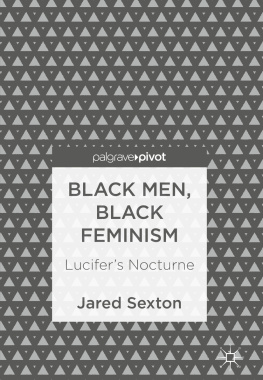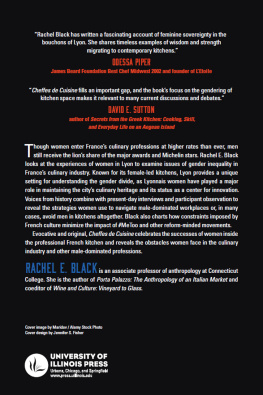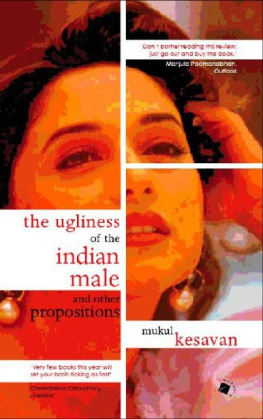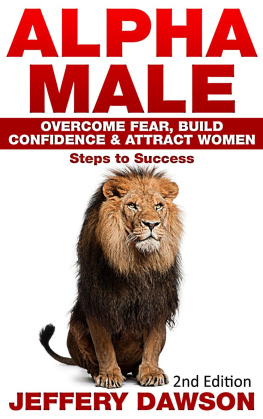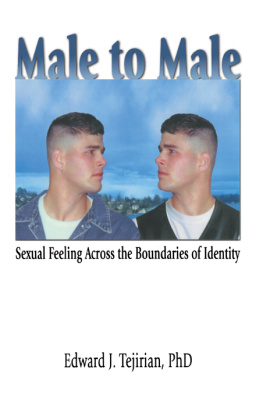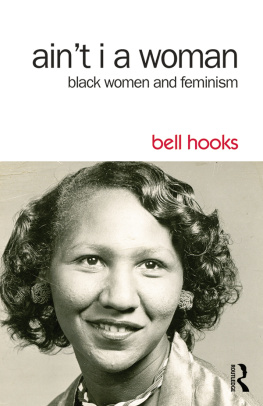BEING BLACK, BEING MALE ON CAMPUS
BEING BLACK, BEING MALE ON CAMPUS
Understanding and Confronting Black Male Collegiate Experiences
DERRICK R. BROOMS
Cover image from shutterstock
Published by State University of New York Press, Albany
2017 State University of New York
All rights reserved
Printed in the United States of America
No part of this book may be used or reproduced in any manner whatsoever without written permission. No part of this book may be stored in a retrieval system or transmitted in any form or by any means including electronic, electrostatic, magnetic tape, mechanical, photocopying, recording, or otherwise without the prior permission in writing of the publisher.
For information, contact State University of New York Press, Albany, NY
www.sunypress.edu
Production, Diane Ganeles
Marketing, Anne M. Valentine
Library of Congress Cataloging-in-Publication Data
Names: Brooms, Derrick R., author.
Title: Being Black, being male on campus : understanding and confronting Black male collegiate experiences / by Derrick R. Brooms.
Description: Albany : State University of New York Press, [2017] | Includes bibliographical references and index.
Identifiers: LCCN 2016031488 (print) | LCCN 2016033936 (ebook) | ISBN 9781438463995 (hardcover : alk. paper) | ISBN 9781438464015 (e-book)
Subjects: LCSH: African American male college students. | African American menEducation (Higher) | African American menSocial conditions. | African American menSocial life and customs.
Classification: LCC LC2781.B757 2017 (print) | LCC LC2781 (ebook) | DDC 378.1/982996073dc23
LC record available at https://lccn.loc.gov/2016031488
10 9 8 7 6 5 4 3 2 1
This Book Is Dedicated to the Memory of
Rufus Brooms Jr.
Beloved Father
Contents
C HAPTER 1
Introduction: Making Space to Hear Black Men
C HAPTER 2
College Aspirations, Expectations, and Concerns: Thinking about and Preparing for College
C HAPTER 3
College as a Learning Experience: Transitioning to College and College Life
C HAPTER 4
Being Black, Being Male on Campus: Experiencing the College Environment
C HAPTER 5
Black Men Emerging: Experiencing Self in College and Engaging Resiliency
C HAPTER 6
Brotherhood and Bonding: Shared Experiences in Black Male Initiative Programs
C HAPTER 7
Black Men in College: (Re)Envisioning the Trajectory
Acknowledgments
First and foremost, I give thanks and praise to my grandmother, Ms. Vivian Covington. Thank you for teaching me how to believe, even in times when the path was not in sight and the valleys seemed too low to continue. Also, thank you for your steadfast example of prayer and service. Each of these has played a critical role in helping me get to this day whole and intact and with a righteous indignation to stay true to myself, always. There are so many reasons why I should not be here, or at least where I am, today. However, I know, without doubt, that the prayers you offered on my behalf and the belief you invested in me are part of my foundation. I am an embodiment of the possibilities that you saw and envisioned.
Second, I thank the men who shared with me during this research project. They trusted me with their experiences, and some of their life stories; they endured my inquiries and allowed me space to listen and learn with and from them. I truly believe in their possibilities and hope that they secure the educational and personal successes that they desire. I hope this work contributes to all of us better appreciating who we are and who we can be.
I cannot separate my yesterday from today. Thus, long before this book was ever conceived, I developed relationships and connected with people who helped me find my place and helped put me on a trajectory to contribute meaningfully. As iron sharpens iron, so one man sharpens another I give a profound thanks to Joseph McCoy, a brother-friend-mentor, confidant, partner, teammate, and one of my success models if I shine, we shine.
In the course of developing the research that for this book, I was strengthened by a community that sustained me throughout the entire process. I benefitted greatly from scholarly and friendly help and support from Bianca Baldridge and Earl Wright II. Earl, thank you for supporting this idea from the very beginning and helping me to shape my ideas into a book project. Bianca, a sincere thank you for reading multiple drafts, asking critical questions throughout, and pushing me to help sharpen my analyses. Thanks to Darryl Brice and Yoshiko Harden who both listened to every idea I shared and encouraged me with each of our interactions. Also, Darryl offered his critical eye, willingly read and reread chapters, and provided thoughtful comments. Individually and collectively, your willingness to listen, read, and offer feedback and critiques were invaluable. Additionally, at various stages of my budding intellectual curiosities and development in my student and professional career, I was nurtured and supported by Edgar G. Epps, Ayana Karanja, Daniel Black, Sandra Taylor, Regina Dixon-Reeves, Mary Pattillo, Reuben May, and Andre Phillips. Also, many thanks to Armon Perry, Siobhan Smith, Gwendolyn Purifoye, Felix Kumah-Abiwu, and Joe Goodman who all provided support as well.
I believe in collectivity and acknowledge that this is not a solo project. I was strengthened by the knowledge that my family, scholarly, and personal communities wanted to see me complete this project. I give thanks to my brothers: Mario, Andre, and Dee, my sister Reisha, and my Brotherhood community: Arthur Davis, Reggie McClain, Matthew Smith, and Matthew McCoy. I give gratitude to my scholar community: Chezare Warren, Alford Young, Jr., Bryan Hotchkins, David Ikard, Billy Jeffries, Marvin Lynn, Odis Johnson, James Moore III, Deadric Williams, Linn Posey-Maddox, Lori Wiebold, Zandria Robinson, Sandra Barnes, BarBara Scott, and Theresa Rajack-Talley. In addition, a larger community supported me on my path: Bob Green, Bannon Stroud, Tanya Robinson, Kenneth Hutchinson, O. T. Mahone, Ana Vazquez, Eric Smith, Leon Gordon, Stanley Muhammad, Bro. Dr. Corey Jordan, Rashad Norris, David Ferguson, Juan Carlos Rivera, Eric Boria, Hank Rich, Kyle French, Carol Ben-Davies, Adrienne Baytops Paul, Matt Wonzier, Nofi Mojidi, Kyle Cepeda, James Snowden, Arlen Wiley, Michael Turner, Booker Whitt, Nicaya Rapier, Lori Tanaka, Ben Potts, Donna Edwards, Phillip Coleman, Broderick Hawkins, Curtis Miller, Poochie, Lee, and Tommie Levinston. My Get UP community: Darion Blalock, Jamil Boldian, Rayvaughn Hines, Marlon Marshall, Anthony Ponder, Byron Caulton, Eric Charles, Anthony Hubbard, Cameron Barnes, Tyler Beck, Dontaye Polk, Smith Francois, Robert Henderson, James Reed, and Rafael Wordlaw. My coaches who helped me find my place at various points: Neal Bailey El, Greg Quick, Mike Orechia, Andrew Thomas, Mr. Bush, and Dick Maloney. And, a community of teachers as well: Dr. Adrian Beverly, Ms. Thomas, Ms. Bell, Ms. Pauline Lee, Ms. Jones, Ms. Williams, Ms. Nettles-Bey, Dr. Harold E. Whitfield, and Mr. Green.
A special thanks to many members of my professional communities at the Association of Black Sociologists, especially our Executive Committee, the Scholars Network on Black Masculinity, and the International Colloquium on Black Males in Education. In these spaces, I attended conferences and fellowshipped with many of the individuals named above; my engagement in events, gatherings, meetings, and annual conferences helped me stay on my path.

